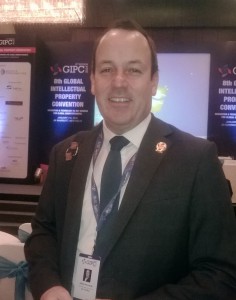
What brings you to India?
Well, it’s a short trip really – the primary goal is to speak at the Global Intellectual Property Convention 2016, but I am also keen to talk to UK and Indian companies about doing business in India, from an IP perspective, and see what they feel are the challenges and indeed benefits to operating here. I’ll also take the opportunity to meet with colleagues in the British High Commission New Delhi as well as IP attaches of other nations (that are based in Delhi). There is also another important facet which is to work with and bounce ideas off you! As you are an IPO-employed attaché that’s based overseas, whilst you get very able support from the High Commission, it’s important that we get to interact together in your ‘backyard’ from time to time!
What are the most common challenges faced by UK companies in India?
I think that there are aspects of timeliness and certainty around rights granting – businesses feel that they would like some processes to be quicker. Access to IP enforcement mechanisms can also be patchy and difficult to navigate and this challenges businesses that are new to the country. Finally, something that I have learned on this trip is the very entrepreneurial nature of much of Indian business and the desire for recognisable support on IP matters for SMEs in India. But I should also say that I have noticed changes in the IP ‘atmosphere’ since my last visit about two years ago, with a growing desire to make adjustments and changes towards a better IP environment.
What can India learn from the UK to bring about IP awareness?
Well, we certainly don’t claim to have thought of everything or to be perfect! But I guess our experience in the UK is that many businesses, especially SMEs don’t have the time and money to think about their IP, often until it is too late. Within the UK economy where intangible assets have outstripped tangible assets, this is a very bad thing, so we in the IPO have invested a lot of time and effort into providing tools, information and techniques to enable businesses to understand, utilise and protect their IP. Importantly, we have tried to make them SME friendly, we have provided differing mechanisms (such as digital/physical lecture programmes) to suit differing needs and we have partnered with industry and the IP professions to share the messaging – that way we have better reach and involvement. We have also looked at messaging for the public – particularly important when we are talking about copyright and the creative industries – so we have awareness programmes that are fun and interactive for children, schools and higher education. Much more information can be found in this very readable publication we recently produced.
How crucial is IP for the Make in India campaign?
I’d say it is fundamental – if you are going to innovate, invent and produce in your country – you want to be sure that you are able to leverage the benefits of that – protecting and enforcing the IP that stems from that work is an important part of the package. And don’t forget those benefits then drip-feed back into the country as a whole, through investment, jobs and tax remittances.
Are you looking forward to the finalised version of India’s national IPR policy?
I am – I know it’s been hotly anticipated by many in the IP-intensive industries operating in India – domestic and foreign. We shall have to see what it says, but I hope that it sets out a vision for a modern IP framework that can hold its head high in this century’s digital, highly competitive, global environment.
